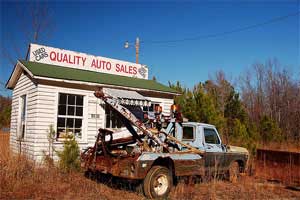Back in 2009, I wrote a story about how sleazy car dealers prey on young service members. I spent some time in Norfolk, Virginia, where the Navy has one of its largest installations in the country. Not by coincidence, the naval bases were ringed by commercial districts chock full of used car dealerships. These dealers were a scourge on the young enlistees, sometimes even dispatching salesmen to greet them at the airport before they could even get to their first assignments. I found several young men who had literally been kidnapped off the base by car salesmen, who refused to return them to the base unless they bought a crappy, overpriced used car with outrageous loan terms. Military lawyers were struggling to deal with the flood of enlistees whose military careers were being threatened by the bad deals, which often left them heavily in debt long after their cars had died (which often happened just after they were driven off the lot).
Despite pleas from military brass, Congress refused to take action. Car dealers, it turns out, are one of the most powerful lobbies in the country, in large part because they are such hometown players. Car dealers sponsor the local Little League teams, run the Rotary Clubs, and have tremendous sway particularly in smaller House districts. And, of course, they donate a lot of money to lawmakers. They’re so influential that they managed to get themselves exempted from oversight by the new Consumer Financial Protection Bureau, leaving them free to continue financing car sales with abusive and overpriced loans.
Two years later, the Federal Trade Commission has finally decided to step in to take a look at the industry and its lending practices. Next week, it will hold the second of a series of roundtable discussions to hear from consumers. This one, held in San Antonio, Texas, will focus on members of the military. Whether or not the roundtables will lead to any real action remains to be seen. But there’s no reason to be too optimistic. The last time the FTC attempted to even pass a tepid disclosure rule dealing with used car sales was back in 1981, when it demanded that they post signs on cars indicating all of the known flaws in the vehicle. In a highly unusual move, Congress, literally in the dark of night, vetoed the rule. (Back then, the law allowed Congress to veto rules issued by regulatory agencies, though the power was rarely invoked.)
The veto was challenged all the way to the Supreme Court and found unconstitutional, so the rule was reinstated. But by then, the makeup of the FTC had changed. Before the rule could take effect, the FTC decided to reconsider it. In 1985, the FTC eventually reissued the rule but without the critical requirement to disclose all known defects. That’s the last time the FTC went after used car dealers. Nearly 30 years later, the political situation hasn’t changed much. If anything, it’s gotten worse. So while the FTC’s roundtables are certainly commendable, consumers, particularly in the military, probably shouldn’t hold their breath waiting for meaningful reform.
















